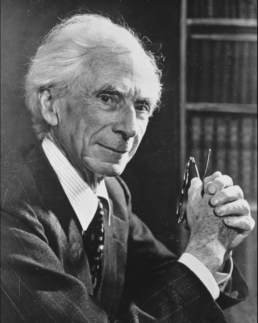These life stories may contain descriptions of childhood trauma and abuse, as well as images, voices and names of people now deceased. If you need help, you can find contact details for some relevant support services on our support page.
Influential British philosopher, mathematician, and writer, Bertrand Russell (1872-1970) was in kinship care as a child.
Bertrand Arthur William Russell was born into the British aristocracy in Monmouthshire, UK. His mother died when he was two and his father two years later. From then, his paternal grandmother, the Countess Russell, had the primary care of the child.
My first vivid recollection is my arrival at Pembroke Lodge in February 1876…What I remember of my first day at Pembroke Lodge is tea in the servants’ hall. It was a large, bare room with a long massive table with chairs and a high stool. All the servants had their tea in this room except the house-keeper, the cook, the lady’s maid, and the butler, who formed an artistocracy in the housekeeper’s room. I was placed upon the high stool for tea, and what I remember most vividly is wondering why the servants took so much interest in me (Russell, 5).
Russell writes fondly of his grandmother in his Autobiography, stressing how her love for him gave him “the feeling of safety that children need (12). His Uncle Rollo and Aunt Agatha also lived at Pembroke Lodge and Bertrand’s older brother was there during school holidays.
The young Bertrand was tutored at home and happy enough; “it was only as adolescence approached that loneliness became oppressive” (20). Reading and mathematics provided an escape.
Throughout this time, I read omnivorously. I taught myself enough Italian to read Dante and Machiavelle. I read Comte, of whom, however, I did not think much…
It must be understood that the whole of this mental life was deeply buried; not a sign of it showed in my intercourse with other people. Socially I was shy, childish, awkward, well behaved, and good natured. I used to watch with envy people who could manage social intercourse without anguished awkwedness (Russell, 30).
The shyness continued when Bertrand first began attending Trinity College Cambridge on a scholarship in 1890, but quickly abated as he made friends.
As an undergraduate I was persuaded that the Dons were a wholly unnecessary part of the university. I derived no benefits from lectures, and I made a vow to myself that when in due course I became a lecturer I would not suppose that lecturing did any good. I have kept this vow (Russell, 57).
Russell abandoned mathematics for philosophy as a result of discussions with his friends – the famous Apostles – and published his first book, German Social Democracy, in 1896 after a visit to Berlin.
He supported the women’s suffrage movement, became a member of the Fabian Society, and a socialist. While imprisoned because of his pacificism during World War I, he wrote his Introduction to Mathematical Philosophy (1919). His inheritance he gave in part to the London School of Economics and also to T.S. Elliott.
Bertrand Russell is recognised as one of the founders of contemporary analytical philosophy and he made important contributions to a broad range of subjects such as ethics, politics, and religious studies over the course of his long career.
To the general public, however, he was best known as a campaigner for peace and as a popular writer on social, political and moral subjects (Monk).
Bertrand Russell was awarded the Order of Merit in 1949 and the Nobel Prize for Literature in 1950.
References:
Irvine, Andrew David, “Bertrand Russell.” The Stanford Encyclopedia of Philosophy, 2020. https://plato.stanford.edu/entries/russell/
Monk, Ray. “Bertrand Russell. British logician and philosopher.” Britannica, 14 May 2022. https://www.britannica.com/biography/Bertrand-Russell
Russell, Bertrand. Autobiography. Routledge, 2009.
Image available here.
